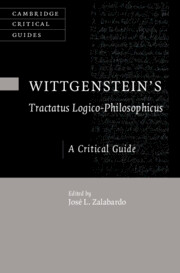Book contents
- Wittgenstein’s Tractatus Logico-Philosophicus
- Cambridge Critical Guides
- Wittgenstein’s Tractatus Logico-Philosophicus
- Copyright page
- Contents
- Contributors
- Introduction
- Chapter 1 Wittgenstein’s Impatient Reply to Russell
- Chapter 2 Modality in Wittgenstein’s Tractatus
- Chapter 3 Clarification and Analysis in the Tractatus
- Chapter 4 The Fish Tale: The Unity of Language and the World in Light of TLP 4.014
- Chapter 5 That Which ‘Is True’ Must Already Contain the Verb: Wittgenstein’s Rejection of Frege’s Separation of Judgment from Content
- Chapter 6 Solipsism and the Self
- Chapter 7 The Tractatus and the First Person
- Chapter 8 Arithmetic in the Tractatus Logico-Philosophicus
- Chapter 9 ‘Normal Connections’ and the Law of Causality
- Chapter 10 The Ethical Dimension of the Tractatus
- Chapter 11 “Obviously Wrong”: The Tractatus on Will and World
- References
- Index
- Cambridge Critical Guides
Chapter 7 - The Tractatus and the First Person
Published online by Cambridge University Press: 07 March 2024
- Wittgenstein’s Tractatus Logico-Philosophicus
- Cambridge Critical Guides
- Wittgenstein’s Tractatus Logico-Philosophicus
- Copyright page
- Contents
- Contributors
- Introduction
- Chapter 1 Wittgenstein’s Impatient Reply to Russell
- Chapter 2 Modality in Wittgenstein’s Tractatus
- Chapter 3 Clarification and Analysis in the Tractatus
- Chapter 4 The Fish Tale: The Unity of Language and the World in Light of TLP 4.014
- Chapter 5 That Which ‘Is True’ Must Already Contain the Verb: Wittgenstein’s Rejection of Frege’s Separation of Judgment from Content
- Chapter 6 Solipsism and the Self
- Chapter 7 The Tractatus and the First Person
- Chapter 8 Arithmetic in the Tractatus Logico-Philosophicus
- Chapter 9 ‘Normal Connections’ and the Law of Causality
- Chapter 10 The Ethical Dimension of the Tractatus
- Chapter 11 “Obviously Wrong”: The Tractatus on Will and World
- References
- Index
- Cambridge Critical Guides
Summary
The method proposed in the Tractatus is to find a perspicuous logic of our language. It thus seems to conform to Russell’s ideal of a scientific method in philosophy. Language, though, is for Wittgenstein essentially the language of the first person. This means that the central issues in the Tractatus, such as ‘What is a sentence?’ and ‘What is a judgement?’, have to be approached by means of a first-person method. Perhaps surprisingly, this method is less vulnerable to psychologism than Russell’s method. How are we to understand the use of the first-person indexical in the Tractatus? It is not used as a referring term: it does not stand for the author, a world-soul, or a transcendental subject. Its function is rather to engage the reader in applying the first-person method when aiming to understand the Tractatus.
- Type
- Chapter
- Information
- Wittgenstein's Tractatus Logico-PhilosophicusA Critical Guide, pp. 125 - 144Publisher: Cambridge University PressPrint publication year: 2024

